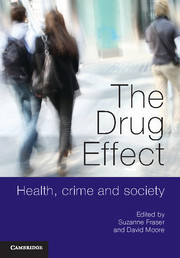Book contents
- Frontmatter
- Contents
- List of contributors
- Acknowledgements
- Introduction
- Part 1 Drug use as social and cultural practice
- Part 2 Drugs, health and the medicalisation of addiction
- Part 3 Drugs, crime and the law
- 9 Court-ordered treatment, neoliberalism and Homo economicus
- 10 Cannabis in cultural and legal limbo
- 11 Drugs, crime and the law in Australia
- 12 Reconceptualising harm reduction in prisons
- 13 Possessed
- Index
- References
13 - Possessed
The unconscious law of drugs
from Part 3 - Drugs, crime and the law
- Frontmatter
- Contents
- List of contributors
- Acknowledgements
- Introduction
- Part 1 Drug use as social and cultural practice
- Part 2 Drugs, health and the medicalisation of addiction
- Part 3 Drugs, crime and the law
- 9 Court-ordered treatment, neoliberalism and Homo economicus
- 10 Cannabis in cultural and legal limbo
- 11 Drugs, crime and the law in Australia
- 12 Reconceptualising harm reduction in prisons
- 13 Possessed
- Index
- References
Summary
Although the balance of power waxes and wanes in line with social and political circumstances, the rhetorical battle between ‘zero tolerance’ and ‘harm minimisation’ has endured for a generation. Politicians in the English-speaking world continue to have consistent recourse to the language of ‘zero tolerance’, despite the manifest success of what is sometimes called ‘harm minimisation’ in reducing deaths from drug overdose, levels of HIV infection among the population of injecting drug users and so on. In fact, one might reasonably surmise that the calls for a return to zero tolerance have grown in intensity precisely as a result of the practical success of such measures.
These two approaches are profoundly different. Harm minimisation measures seek to improve the health and longevity of drug users even if those measures lead to an overall increase in use. Zero tolerance measures seek to decrease drug use even if those measures worsen the health and longevity of those who use drugs. The former asks of drug users: are they well? Are they stable? Do they resort to crime? Do they have a job? The latter asks of drug users: are they still using? The former are relativists in every meaningful sense, including believing that illegal drugs can be more or less bad depending on the circumstances. The latter are absolutists in every meaningful sense, including believing that illegal drugs are absolutely bad under all circumstances. From the point of view of public policy or effective legal regulation, such absolutism is puzzling. It is not, of course, that the consumption of drugs such as heroin is harmless, by any means, but at the same time it is surely almost beyond dispute that the current legal regime of prohibition makes matters worse from the point of view of every conceivable indicator of health and social efficacy. Yet the position seems ultimately resistant to all argument.
- Type
- Chapter
- Information
- The Drug EffectHealth, Crime and Society, pp. 225 - 239Publisher: Cambridge University PressPrint publication year: 2011
References
- 3
- Cited by



